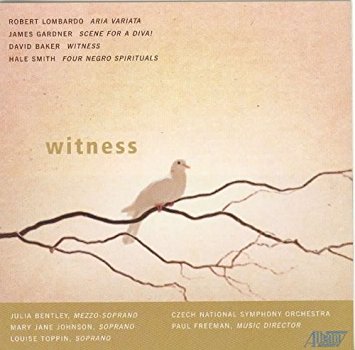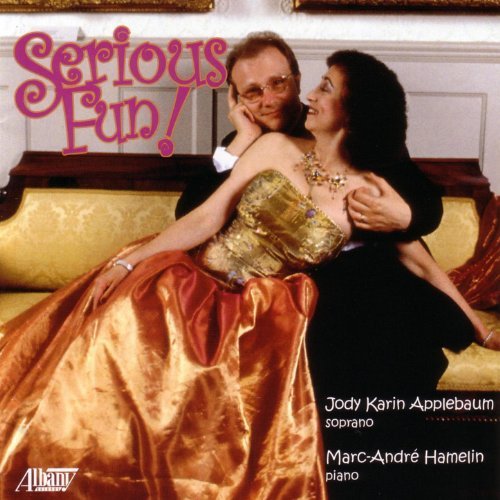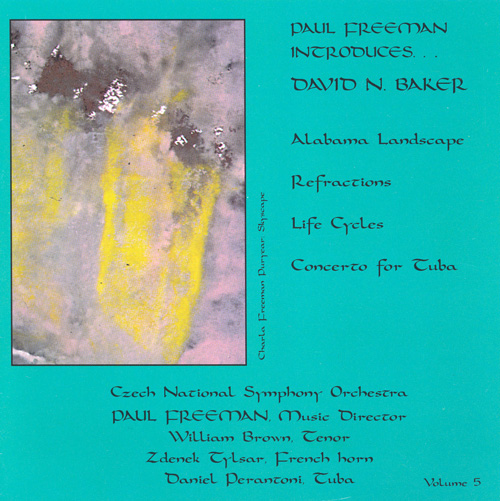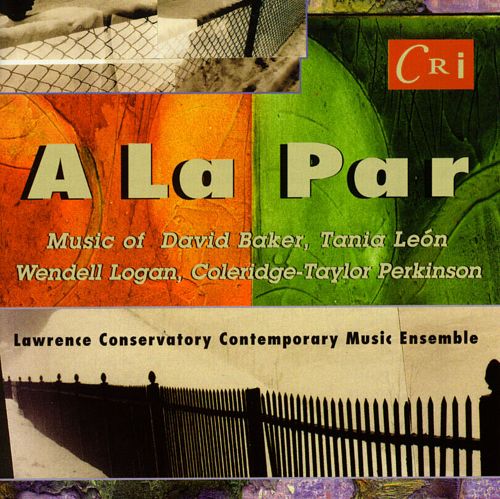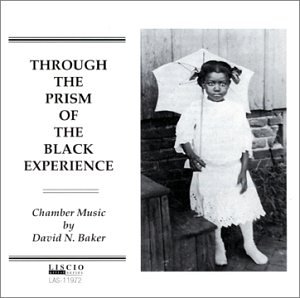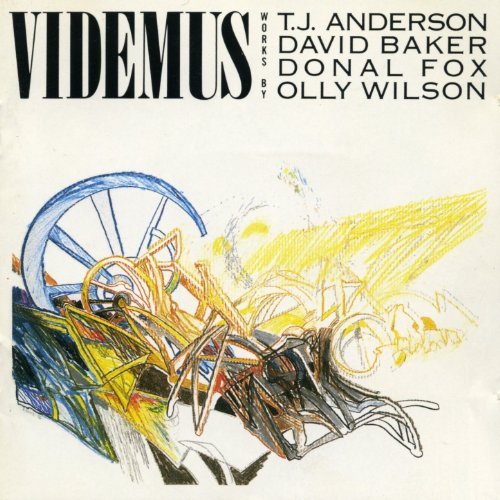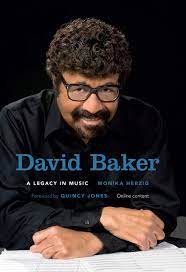Listen
Track:
About
David Baker (December 21, 1931 – March 26, 2016) was a composer, teacher, performer, and author from Indianapolis, IN. He grew with the influences of the rich music culture surrounding him, especially jazz, R&B, and gospel music. He started in the Indianapolis jazz scene in his teens, establishing himself as a young musician early in life. After attending the Arthur Jordan Conservatory of Music, Baker went on to Indiana University. There he received a Bachelor of Music Education degree in 1953 and a master’s shortly thereafter. While he was denied a career in symphony orchestras due to his race, he made a successful career in jazz playing in the ensembles of Quincy Jones and George Russell. After a jaw injury resulting from a car accident in 1953, he was left unable to play the trombone by the early 1960’s and was forced to switch to the cello. During that time, he joined the faculty at Lincoln University in Jefferson City, MO. Baker then joined the faculty of Indiana University in 1966, and founded the jazz studies department in 1968. He served as chair of the program until 2013. This program was among the first of its kind in American universities, as jazz had not yet been incorporated into the music curriculum at all. In 1990, Baker became the first artistic director of the Smithsonian Jazz Masterworks Orchestra and served that position until 2012. His achievements have earned him nominations for Grammys and the Pulitzer Prize, even being asked to serve on the prize’s Music Jury six times. Baker’s catalogue includes over 2,000 works and is characterized by his fusion of his passions for Western classical music with jazz and other genres. Many of his vocal works choose texts about Black cultural themes and topics. As a performer and author he has produced more than 65 recordings, 70 books, and 400 articles.
—Tyrese Byrd
This profile was created in 2021 as part of The Savvy Singer, an EXCEL Lab course at the University of Michigan, School of Music, Theatre, and Dance and a collaboration with the Hampsong Foundation via the Classic Song Research Initiative.
“David Baker.” African Diaspora Music Project. Accessed December 16, 2021. http://africandiasporamusicproject.org/david_baker.
Fox, Margalit. “David Baker, Who Helped Bring Jazz Studies Into the Academy, Dies at 84.” The New York Times. March 29, 2016. https://www.nytimes.com/2016/03/30/arts/music/david-baker-who-helped-bring-jazz-studies-into-the-academy-dies-at-84.html.
Johnson, John Andrew. “International Dictionary of Black Composers.” Book. Chicago ; London: Fitzroy Dearborn, 1999.
Related Information
Songs
A Good Assassination Should Be Quiet
David N. Baker
Mari Evans
Song Collection: The Black Experience
Early in the Mornin'
David N. Baker
Mari Evans
Song Collection: The Black Experience
If There Be Sorrow
David N. Baker
Mari Evans
Song Collection: Through This Vale of Tears
Status Symbol
David N. Baker
Mari Evans
Song Collection: The Black Experience
The Black Experience
Song CollectionDavid N. Baker
Mari Evans
Through This Vale of Tears
Song CollectionDavid N. Baker
Mari Evans
Recordings
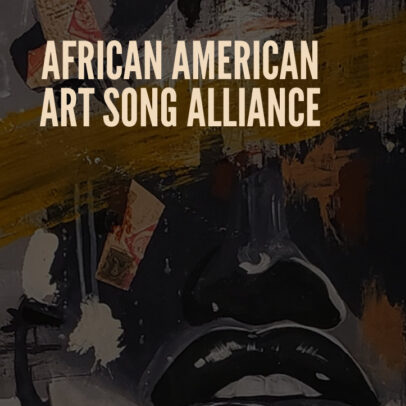
Fires of Justice
(David N. Baker, B. E. Boykin, Adolphus C. Hailstork, Andre Myers, Shawn E. Okpebholo, Robert Owens and Dave Ragland)
2022
View recording
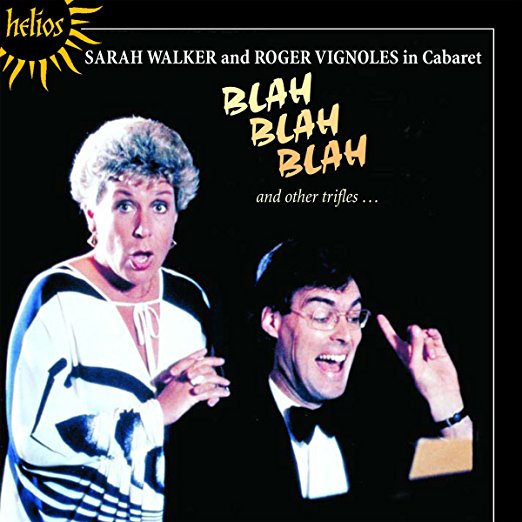
Blah Blah Blah & Other Trifles
(David N. Baker, Leonard Bernstein and William Bolcom)
1988
Sheet Music
David N. Baker Sheet Music
Buy via Keiser ClassicalAnthology of Art Songs by Black American Composers, Compiled by Willis C. Patterson
Composer(s): H. Leslie Adams, David Baker, Margaret Bonds, Charles Brown, Cecil Cohen, Noel de Costa, Mark Fax, Adolphus C. Hailstork, Eugene Hancock, Thomas Kerr, Jr., Charles Lloyd, Jr., Wendell Logan, Maurice McCall, Dorothy Rudd Moore, Undine Smith Moore, Robert Owens, Coleridge-Taylor Perkinson, Florence Price, Hale Smith, William Grant Still, Howard Swanson, George Walker, Olly Wilson, John Work, Jr.
Song(s): For You There is No Song (H. Leslie Adams)
Early in the Mornin' (David Baker)
A Good Assassination Should Be Quiet (David Baker)
Status Symbol (David Baker)
Three Dream Portraits: Minstrel Man; Dream Variations; I, Too (Margaret Bonds)
The Barrier (Charles Brown)
Song Without Words (Charles Brown)
Death of an Old Seaman (Cecil Cohen)
Two Songs for Julie Ju (Noel da Costa)
Cassandra's Lullaby (Mark Fax)
Love (Mark Fax)
A Charm at Parting (Adolphus C. Hailstork)
I Loved You (Adolphus C. Hailstork)
Absalom (Eugene Hancock)
Nunc Dimittis (Eugene Hancock)
Riding to Town (Thomas Kerr, Jr.)
Compensation (Charles Lloyd, Jr.)
If There Be Sorrow (Wendell Logan)
Marrow of My Bone (Wendell Logan)
Chanson Triste (Maurice McCall)
Sweet Sorrow (Maurice McCall)
Weary Blues (Dorothy Rudd Moore)
Love Let the Wind Cry...How I Adore Thee (Undine Moore)
Faithful One (Robert Owens)
Genius Child (Robert Owens)
A Child's Grace (Coleridge-Taylor Perkinson)
Melancholy (Coleridge-Taylor Perkinson)
Night (Florence Price)
Song to the Dark Virgin (Florence Price)
Velvet Shoes (Hale Smith)
Grief (William Grant Still)
A Death Song (Howard Swanson)
I Will Lie Down in Autumn (Howard Swanson)
The Negro Speaks of Rivers (Howard Swanson)
Lament (George Walker)
A Red, Red Rose (George Walker)
Wry Fragments (Olly Wilson)
Dancing in the Sun (John Work, Jr.)
Soliloquy (John Work, Jr.)
An Anthology of African and African Diaspora Songs - 60 Songs
Composer(s): H. Leslie Adams, David N. Baker, Margaret Bonds, Charles Brown, H. T. Burleigh, Valerie Capers, Samuel Coleridge-Taylor, Arthur Cunningham, Harriette Davison Watkins, William Dawson, Mark Fax, Bruce Forsythe, Antônio Carlos Gomes, Adolphus Hailstork, Jacqueline Hairston, Maud Cuney Hare, Jeraldine Herbison, Jonathan Holland, Sylvia Hollifield, Langston Hughes, J. Rosamond Johnson, Thomas Kerr, Lena McLin, Undine Smith Moore, Andre Myers, Camille Nickerson, Fred Onovwerosuoke, Eurydice Osterman, Robert Owens, Coleridge-Taylor Perkinson, Zenobia Powell Perry, Rosephanye Powell, Florence Price, Dave Ragland, Nadine Shanti, Carlos Simon, Hale Smith, Irene Britton Smith, Brandon Spencer, Hilbert Stewart, Howard Swanson, George Walker, Aurelia Young
Song(s): Amazing Grace (H. Leslie Adams)
Christmas Lullaby (H. Leslie Adams)
Sence You Went Away (H. Leslie Adams)
The Heart of a Woman (H. Leslie Adams)
The Alarm Clock (David N. Baker)
The Negro Speaks of Rivers (Margaret Bonds)
Caring (Charles Brown)
Desire (Charles Brown)
Your Eyes So Deep (H. T. Burleigh)
Your Lips Are Wine (H. T. Burleigh)
Autumn (Valerie Capers)
Elëanore (Samuel Coleridge-Taylor)
The Willow Song (Samuel Coleridge-Taylor)
Minakesh (Arthur Cunningham)
Stars (Harriette Davison Watkins)
Out in the Fields (William Dawson)
The Refused (Mark Fax)
With Rue My Heart Is Laden (Bruce Forsythe)
Suspiro d’alma (Antônio Carlos Gomes)
If I Can Stop One Heart from Breaking (Adolphus Hailstork)
Longing (Adolphus Hailstork)
Loveliest of Trees (Adolphus Hailstork)
Dormi, Jesu (Jacqueline Hairston)
Gardé Piti Mulet Là (Maud Cuney Hare)
I’ll Not Forget (Jeraldine Herbison)
Little Elegy (Jonathan Holland)
In Time of Silver Rain (Sylvia Hollifield)
The Founding Fathers (Langston Hughes)
This is My Land (Langston Hughes)
L’il Gal (J. Rosamond Johnson)
Soliloquy (Thomas Kerr)
Amazing Grace (Lena McLin)
The Year’s at the Spring (Lena McLin)
I Am in Doubt (Undine Smith Moore)
I Want to Die While You Love Me (Undine Smith Moore)
For a Poet (Andre Myers)
Chere, Mo Lemmé Toi (Camille Nickerson)
Gué, Gué, Solingaie (Camille Nickerson)
Mshila (Fred Onovwerosuoke)
Entreaty (I Am the Rose of Sharon) (Eurydice Osterman)
Could I but Ride Indefinite (Robert Owens)
Die Nacht (Robert Owens)
From the Dark Tower (Robert Owens)
The Lynching (Robert Owens)
The Secret (Robert Owens)
Madrigal (Coleridge-Taylor Perkinson)
O Children of Men (Zenobia Powell Perry)
I Want to Die While You Love Me (Rosephanye Powell)
Spring (Florence Price)
The Sum (Florence Price)
Martin Luther King, Jr. (Dave Ragland)
Mangez, Boulez (Eat, Drink, Be Merry) (Nadine Shanti)
Prayer (Carlos Simon)
Troubled Woman (Hale Smith)
Why Fades a Dream? (Irene Britton Smith)
Dream Variations (Brandon Spencer)
Spring Song (Hilbert Stewart)
One Day (Howard Swanson)
I Went to Heaven (George Walker)
Norris Swamp (Aurelia Young)
Voice Type: 36 Songs are for High Voice - Medium to High Voice
24 Songs are for Medium - Medium to Low Voice


